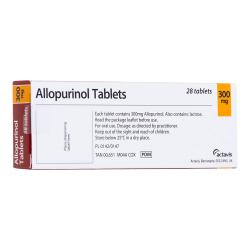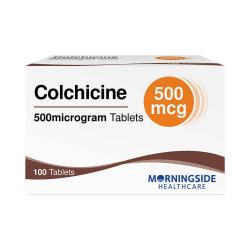Login to your account
- Private & confidential service
- Genuine medication
- All-inclusive service - No hidden fees
- Next day delivery
- Gout
Gout: start your consultation
- 1. Answer the online medical questions
- This helps our doctors to decide which treatment is safe for you
- 2. Select your treatment
- You will see a list of recommended treatments. You can select the one you prefer.
- 3. Checkout and delivery
- Once you’ve completed the checkout, our doctors will review your answers. If all is safe, you will receive your treatment tomorrow.
Gout
Gout is a painful condition that causes pain and swelling around the toes. Gout most commonly affects the big toe, but can occur across the body. Whilst generally caused by an unhealthy lifestyle and is more prevalent in older men, gout can happen to anyone. You can purchase medications to treat and prevent episodes of gout here at HealthExpress.
Topics
What is gout?
Gout is a form of arthritis which causes painful flare-ups on the joints across the body. It is also known as “the disease of kings” or “rich man’s disease” as many historic kings struggled with the condition but gout has been believed to be present ever Trusted source The Lancet Peer-reviewed Journals Global Health Go to source since the time of the Ancient Egyptians.
However, it is not a historic disease by any means and is still very common. One study in 2017 found that there were 41.2 million cases of gout, a number that had doubled since 1990. It is also the most common type of inflammatory arthritis in men especially.
What causes gout?
Gout is caused by high levels of a substance in the body known as uric acid (hyperuricaemia). Uric acid is created when the body’s digestive system breaks down chemical substances, known as purines, which come from the food we eat (particularly red meat and seafood).
Uric acid is typically dissolved in the blood, passed through the kidneys and leaves the body through your urine. However, if you eat too many foods high in purines or your digestive system isn’t able to process these purines, then they build up. When uric acid builds up, it forms sharp crystals in a joint and surrounding tissue which causes pain, inflammation and swelling.
Who is more at risk of developing gout?
Some are more likely to develop high levels of uric acid in their blood than others. It is particularly prevalent in older men but other risk factors for gout include:
- having a diet high in red meat, shellfish, beer and sweetened beverages
- being overweight - your kidneys have more difficulty removing excess uric acid in your blood
- having certain conditions such as diabetes, high blood pressure, heart and kidney problems
- taking certain medications such as aspirin and blood pressure medications
- having a family history of gout
- having a recent surgery or trauma
What does gout look like?
Gout is characterised by a severe, sudden pain in one of your joints. It most commonly affects the big toe, but can affect other joints in your feet, hands, wrists, elbows or knees.
It can be difficult to diagnose any pain or skin condition, but gout has several distinguishing symptoms:
- inflammation and swelling
- red skin that is shiny and warm to touch
- difficulty moving the affected joint
- affects walking (if symptoms occur in the feet)
Gout doesn’t typically occur with a fever or feeling sick. If you’re experiencing these symptoms alongside any pain or inflammation, it may be an infection or cellulitis and you should speak to a medical professional as soon as possible.
How long does gout last?
The pain typically starts early in the morning or late at night but becomes its worst around 4 - 12 hours after symptoms appear.
A gout attack lasts around 5 - 7 days. Some people may never experience another attack, however some people experience frequent bouts which can progressively get worse and affect multiple areas of the body.
How do you treat gout?
In most cases, you will need prescription medications that lower uric acid levels and quickly alleviate symptoms of a gout attack.
For quick relief of an attack, you will be prescribed Colchicine. It works quickly to act against the inflammatory response of the urate crystals. For most people, the medication works in 12 hours but can take up to 1 - 2 days. It’s important you take this medication as soon as you spot symptoms so you can get rid of it as quickly as the symptoms appeared.
Alongside this, you can take NSAIDs (non-steroidal anti-inflammatory drugs) such as ibuprofen to help with the pain and inflammation. Your doctor may also prescribe stronger NSAIDs such as Naproxen or Celecoxib.
During a gout attack, you should make sure to also:
- rest and raise the affected joint if possible
- keep the joint cool by using an ice pack or bag of frozen peas
- drink lots of water (if you are instructed to do so)
- avoid covering affected joint with clothes, especially at night
If you have frequent attacks of gout, you may require a longer course of treatment to prevent gout. The drug Allopurinol works by reducing uric acid production, preventing spikes of uric acid levels which would result in crystals forming in the joints.
Can I prevent gout attacks?
Diet
The main way you can prevent frequent attacks of gout is by altering your diet. A healthy, balanced diet is very important for general wellbeing but can also. However, in the case of gout, there are specific foods you should avoid as they are high in purines and could therefore trigger a gout attack.
These foods include:
- liver, kidneys or heart (a type of meat known as offal)
- game meats (e.g pheasant, rabbit or venison)
- oily fish (e.g sardines, herring, mackerel or anchovies)
- seafood (e.g crab, mussels, fish roe and caviar)
- marmite, bovril and instant gravy granules
- beer
In addition, red meat, poultry, legumes and other foods contain moderate amounts of purines and therefore should be eaten in moderation. These foods are important for key nutrients such as protein and iron, but too much of it can cause spikes in your uric acid levels.
On the other hand, some foods have been found to be great natural remedies for gout. Sour cherries or sour cherry juice have been found to help with the inflammation. Additionally, a diet high in vitamin C can actually reduce uric acid levels, such as from:
- oranges and other citrus fruits
- strawberries
- blackcurrants
- broccoli
- brussel sprouts
- potatoes
For more information on a gout diet, Gout Society UK has a comprehensive fact sheet on foods to avoid and how to eat healthily with gout.
Lifestyle
As well as prescription treatment and diet, making permanent lifestyle changes can help prevent frequent bouts of gout and improve your health overall such as:
- cutting down on alcohol
- losing weight
- drinking plenty of fluids
- exercising regularly (low impact exercise that doesn’t stress your joints)
- quitting smoking
- taking vitamin C tablets
How do I buy treatment online?
At HealthExpress, we offer both Colchicine and Allopurinol for the treatment and prevention of gout attacks respectively, provided you have had a previous diagnosis of gout. All you have to do is fill out a confidential medical questionnaire which will be reviewed by one of our registered doctors. Once they have found you suitable for treatment, your medication will be dispatched with free next-day delivery.
medical form
medication
prescription
from pharmacy



